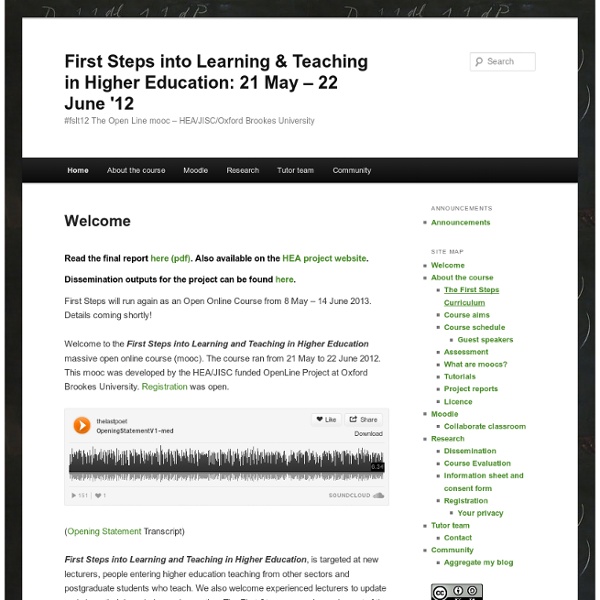First Steps into Learning & Teaching in Higher Education: 21 May – 22 June '12
Read the final report here (pdf). Also available on the HEA project website. Dissemination outputs for the project can be found here. First Steps will run again as an Open Online Course from 8 May – 14 June 2013. Details coming shortly! Welcome to the First Steps into Learning and Teaching in Higher Education massive open online course (mooc). (Opening Statement Transcript) First Steps into Learning and Teaching in Higher Education, is targeted at new lecturers, people entering higher education teaching from other sectors and postgraduate students who teach. Building on OCSLD’s experience of running courses for a national and international audience, First Steps into Learning and Teaching in Higher Education will be an open online course, free to the global academic community, with peer and general tutor support. The course also offers assessment, leading to an OCSLD Certificate, for up to 25 participants.
A Close Up Look at an Upcoming May MOOC
Wow. Seems this week is filled with news of online education start-ups and the beginnings of universities that offer massive open online classes (MOOCs). Here are three such articles from the past two days alone. 1. 2. 3. With all the announcements lately about open education and free online courses, I thought I should do one too. Well anyway, here is the news. This course will be free and open to anyone with Web access. Blackboard Note related to the event: According to Blackboard, "As a free resource for individual educators, CourseSites has removed a common barrier of access to teaching and learning technology. Per Blackboard: Announcing a Free, Open Course With Dr. Course Title: Instructional Ideas and Technology Tools for Online Success Link to the landing page: Interest Form Blog Announcement: Empowering You Through Openness and Choice CourseSites Blog MOOC Host: CourseSites (from Blackboard) announces a Massive Open Online Course (MOOC) 2. 4. 5. About Dr.
Pedagogy First!
Here I go thinking that I can quickly finish this task as I’m on catch up mode big time. I should have known better!! Having watched the video and read the articles, I am left thinking about Issac Asimov’s Foundation series. A lot of what was said makes me think that we have to be very careful where we go with learning. I think we have to be careful to ensure that students are given the problem solving skills to interact with the vast range of information available to us rather than just relying on being able to find out what we want to know when we want to know about it. First the video I usually turn up my nose at theory as I see myself as a more application person, but the content of this video totally hooked me. As time went on and as my study needs changed, I moved to extramural study (management and maths) in the late 1980s to the early 2000s. Coming back to face to face teaching (IT) in the mid 200s was an interesting time because the Internet was here and making a big impact.
change.mooc.ca
Welcome to MOOC.CA ~ MOOC
Related:
Related:



